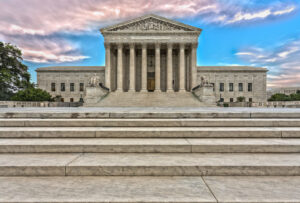Federal judge blocks Louisiana’s law requiring Ten Commandments in schools
A federal district judge in Baton Rouge blocked a Louisiana law requiring the display of the Ten Commandments in public schools statewide.
The law passed earlier this year mandates a poster-sized…

A federal district judge in Baton Rouge blocked a Louisiana law requiring the display of the Ten Commandments in public schools statewide.
The law passed earlier this year mandates a poster-sized display of the biblical writ, also known as the Decalogue, in each public school classroom, according to the Associated Press.
“If you want to respect the rule of law, you’ve got to start from the original lawgiver, which was Moses,” said Louisiana’s Gov. Jeff Landry, a Republican, when he signed the bill into law.
U.S. District Judge John W. deGravelles, who was appointed to the bench in 2014 by then-President Barack Obama, disagreed.
deGravelles, in his 177-page decision, wrote that the law’s “mandatory practice [of displaying the Decalogue] is coercive,” in part because the state requires that parents “send their minor children to school and ensure attendance during regular school
hours at least 177 days per year.”
On the face of it, the judge said the law violated the Establishment Clause of the U.S. Constitution, “impermissible” under a previous ruling in 1980 in Stone v. Graham.
In that case on a similar law in Kentucky, the U.S. Supreme Court found in a 5-4 decision that requiring the display of the Ten Commandments “had no secular legislative purpose”.
However, Louisiana Attorney General Elizabeth Murrill argued that under the Louisiana law, the Ten Commandments were a part of the foundational documents of the country.
But deGravelles said, “The Louisiana and Kentucky laws both single out the Decalogue for central display (in the case of the Louisiana statute, central focus) while declining to give similar preferential treatment to foundational documents like the U.S. Constitution, the Declaration of Independence, or the Magna Carta.”
Murrill had also argued that the Decalogue was part of standard textbooks earlier in U.S. history, noting that the Ten Commandments were included in The New England Primer, McGuffey Reader and textbooks published by Noah Webster.
The judge, however, agreed with the plaintiffs, who argued those textbooks came from a time when schools were largely run by religious individuals and institutions “during the early decades of the nineteenth century, before the rise of public education.”
Louisiana’s attorney general promised to fight the decision.
“We strongly disagree with the court’s decision and will immediately appeal,” Murrill said in a statement.
Murrill said that she wasn’t surprised by the decision, which is why she filed a motion for a stay of the forthcoming ruling before the judge even decided the case. That request was denied by deGravelles.
Murrill told Tony Perkins of Family Research Council she believes the law meets the current constitutional standard to provide historical context needed to display the Ten Commandments in a public school setting.
She also maintained that the judge’s order can only apply to the five school districts that were included in the suit, while 67 other school districts still have to obey the Louisiana law.
But in his order, deGravelles is requiring the state “to provide notice of this ruling to all Louisiana public elementary, secondary, and charter schools, and all public post-secondary education institutions,” even the schools not included in the suit.
That conflict could help speed a resolution to the case more quickly.
“After we file for a stay in the Fifth Circuit, it could be within the week we obtain a stay on the ruling and everybody is back in business,” Murrill said.



